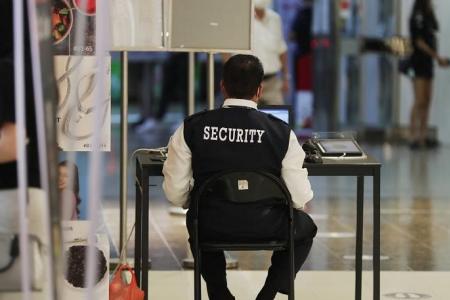Resource portal set up for security customers as refreshed industry roadmap pushes for outcome-based contracts
To get more customers to adopt outcome-based contracts (OBCs) for security services, a one-stop resource portal has been set up to help them understand such agreements.
The Singapore Police Force’s Centre for Protective Security (CPS) worked together with security industry associations to set up the portal, which is hosted on the Singapore Police Force’s website.
Unlike traditional security contracts, where a fixed number of security personnel are deployed on premises, OBCs are based on expected outputs and outcomes.
The push is part of efforts under a refreshed industry transformation map (ITM) for private security companies that was announced on Wednesday. The map will further prepare the industry for a new model of delivering services.
The first version of the roadmap, which was launched in 2018, has helped the industry move from a manpower-intensive model to one that integrates skilled manpower and technology.
The refreshed roadmap was unveiled by Minister of State for Home Affairs Sun Xueling at the Security Industry Conference 2022. Held at Sands Expo and Convention Centre, the event was attended by more than 300 guests, including tripartite partners and government agencies.
In a press release, the Home Affairs Ministry (MHA) said OBCs have spurred security agencies to deliver more innovative and productive solutions.
About two-thirds of public service agencies now use OBCs, while about seven in 10 private sector buyers are planning to adopt such contracts, MHA added.
Said Ms Sun of the resource portal: “You will be able to read about experiences from others who have undergone the OBC journey… as well as find information on courses, grants for technology adoption, and even contract templates.
“Among the available resources on the portal is the MHA OBC Guide, first launched in 2018 to guide the industry on OBC adoption, which has since been updated to reflect industry developments.”
Another area of focus for the refreshed roadmap is to spur adoption of advanced and interoperable technology.
MHA pointed out that In recent years, many security agencies have made technological solutions such as automated visitor registration machines and wearable security devices mainstays of their operations.
The shift towards integrated facilities management - where different services such as cleaning, security, landscaping are managed together - has also encouraged service buyers to consider using technology to meet their premises’ needs.
To support these developments, MHA and the Infocomm Media Development Authority will update the Security Industry Digital Plan (IDP), so that it remains relevant to the security agencies and supports their digitalisation plans.
“The refreshed IDP will see an updated digital roadmap to guide the industry in using advanced solutions in their operations, migrate to integrated solutions to achieve efficiencies, and use data protection and cybersecurity tools to safeguard their businesses,” said MHA.
The updated roadmap also aims to raise skills of the security workforce.
Ms Sun said that CPS and SkillsFuture Singapore have worked alongside tripartite partners to identify priority digital skills to ensure security officers’ skills and competencies remain relevant.
“New security officers will also be trained in in-demand skills such as conflict management, customer orientation, and problem-solving so that they can manage and de-escalate conflicts when on duty,” she said, adding that this will be implemented next year, and more details will be announced later.
The bar will also be raised for new entrants in the market. From July 1, 2023, new security agency licence applicants must have initial paid-up capital of $500,000, up from $300,000.
“We must ensure that new security agencies must be financially sound to enter the industry so that they can better support wages and welfare for officers, as well as offer suitable technology solutions to deliver security outcomes efficiently,” said Ms Sun.
“This is the first adjustment since 2013 and a necessary one to better reflect the needs of the sector today.”
Get The New Paper on your phone with the free TNP app. Download from the Apple App Store or Google Play Store now



